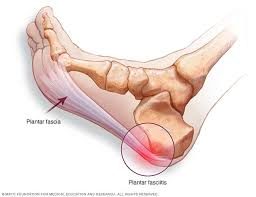Could I have Plantar Fasciitis/Fasciosis?

Plantar fasciitis also referred to as plantar fasciosis due to its non-inflammatory nature, is a painful condition involving the connective tissue or fascia at the bottom of the foot.
The plantar fascia blends with the paratendon or sheath of the Achilles tendon, the small foot muscles and even the skin and subcutaneous tissue.
This condition affects people of all ages although it is most often seen in people in middle age. Females are affected more often than males and it is also common in athletic populations accounting for 8-10 percent of running injuries. It is the most common foot condition treated in physiotherapy clinics and makes up 40% of all visits to podiatry clinics.
There are several risk factors for plantar Fasciitis/Fasciosis including:
- Limited foot range of motion
- Excessive foot pronation
- Weight bearing activities such as prolonged standing/running
- High BMI
- Diabetes Mellitus and other metabolic conditions
Presentation
It often presents as pain on taking the first steps in the morning, or after periods of non-weight bearing. Sufferers also complain of tenderness of the heel and tightness in the Achilles tendon. A limp is often seen, and many people have had a sudden increase in their activity before the onset of their symptoms.
Other conditions which may appear similar to plantar fasciosis, include Sever’s Heel (in adolescents), Achilles tendinopathy, referred pain from the lumbar spine and calcaneal (heel) stress fracture. Your physiotherapist here in Somerton Physio will perform a thorough assessment to rule out these and other conditions which might cause your heel pain.
Plantar Fascitis / Faciosis Treatment ?
Following initial assessment your physiotherapist will provide a plan including specific stretching and strengthening exercises to target the lower limbs in particular the calf muscles and plantar fascia itself. Your therapist might also use some soft tissue techniques or joint mobilisations to improve the flexibility and movement of the calf muscles and foot and ankle joints. Finally, orthotics are sometimes fitted which can provide relief in some cases.
One client who attended our clinic here in Dublin 15 reported an improvement in his heel pain after one or two sessions involving soft tissue massage of his calves and a stretching and strengthening programme as described above. Before treatment he was unable to walk more than a few metres and over the course of four or five visits he had built up to two kilometres daily. In some cases, improvement can take a lot longer depending on the severity and duration of a person’s symptoms and attention may be given to weight loss if having a high BMI is an issue.
Should you be suffering from heel pain and are unsure if it is due to plantar fasciosis or another cause, it is worth consulting one of our experienced physiotherapists to get an accurate diagnosis and get started on a tailor-made exercise programme. It could help you avoid having heel pain for months longer than necessary!
You can also check out our Running Performance Lab, located in our clinic in Castleknock GAA Clubhouse, where we provide a platform for recovering athletes to regain their full potential. We review your running technique from multiple angles in our state-of-the-art facility. We then analyze your run using world leading movement capturing software (Dartfish) in order to construct a plan tailored to your needs.
We treat runners of all backgrounds, whether you are a beginner, recreational runner or an elite athlete. If you are suffering from running related pain or just want to improve your running times, our detailed assessment and treatment plans and packages will help you to take your training to the next level. Click here for further details.
To get in touch email us on [email protected] or phone us on (01) 9069566 . Follow us on Instagram for physiotherapy and clinic Updates.
